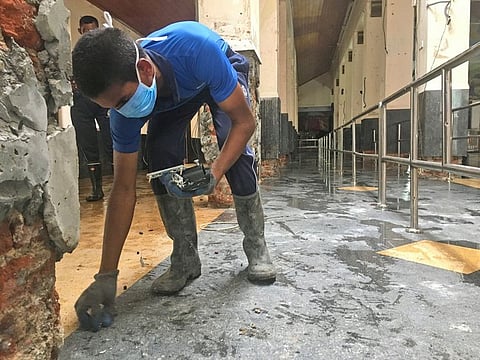With churches shut after Easter bombings, Sri Lankans celebrated mass on TV
Sri Lanka's Catholics awoke to celebrate Mass in their homes by a televised broadcast

AMPARA, Sri Lanka: Sri Lanka's Catholics on Sunday awoke to celebrate mass in their homes by a televised broadcast as churches across the island nation shut over fears of militant attacks, a week after the Islamic State-claimed Easter suicide bombings killed over 250 people.
Cardinal Malcolm Ranjith, the archbishop of Colombo, delivered a homily before members of the clergy and the country's leaders in a small chapel at his Colombo residence - an extraordinary measure underlining the fear still gripping this nation of 21 million people.
"This is a time our hearts are tested by the great destruction that took place last Sunday," Ranjith said. "This is a time questions such as, does God truly love us, does He have compassion towards us, can arise in human hearts."
In a rare show of unity, President Maithripala Sirisena, Prime Minister Ranil Wickremesinghe and opposition leader Mahinda Rajapaksa attended the mass. Their political rivalry and government dysfunction are blamed for a failure act upon near-specific information received from foreign intelligence agencies that preceded the bombings.
The U.S. Embassy in Colombo has warned against attending any service at a place of worship this weekend.
In the eastern district of Ampara on Sunday, where a gunfight and explosions left 15 people dead the previous day, soldiers guarded St. Mary Magdalen's Church, where a sign on the gate said the church and the school would be closed until May 6. A nearby mosque also had soldiers stationed outside.
At the YMCA, a group of young girls held Sunday school near a portrait of Christ. Sajith Liyanage, a 51-year-old Catholic, said he remained worried and would watch Mass on TV.
"We can't understand what the situation is right now," Liyanage said.
At Ampara's weekly Sunday market, police officers walked explosive-sniffing dogs past ripe-yellow bananas, pineapples and coconuts. Officers also searched women's bags and pushed aside brown fallen leaves, checking the grounds for any bombs.
N.M. Saman Bandarah, a pineapple seller, stood back as the police dog passed. He said he was glad to see the officers but said everyone remained nervous.
"There are no people coming to buy," he said.
Daesh, meanwhile, claimed three of the militants who blew themselves up during a bloody police raid in Ampara linked to the Easter bombings.
In a statement carried by the extremists' Aamaq news agency, Daesh identified the bombers by their noms du guerre as Abu Hammad, Abu Sufyan and Abu al-Qa'qa. It said they opened fire with automatic weapons and "after exhausting their ammunition, detonated ... their explosive belts."
Gun battle and explosions on Saturday
Sri Lanka's military said the gunfight Friday night near the town of Sammanthurai left 15 dead, including six children, when militants opened fire and set off explosives in suicide bombings as security forces closed in on their safe house.
Daesh falsely claimed their militants killed 17 "disbelievers" in the attack. The militants often exaggerate their claims.
The Daesh report carried a photograph of two men before a Daesh flag, one carrying a Chinese variant of the Kalashnikov rifle like the one found at the scene, another smiling.
A girl and a woman survived the explosion but were critically injured and being treated at a hospital, police spokesman Ruwan Gunasekara said.
Photographs taken by The Associated Press show the charred remains of one child and the body of another wearing a green T-shirt with the words "good boy" written on the back. The bodies of an adult woman and man were found after the explosion with their clothes burned off.
The military said security forces had recovered explosives, detonators, "suicide kits," military uniforms and Daesh flags during the raids in the area.
Gunasekara said officers acting on information from intelligence officials also found 150 sticks of blasting gelatin and 100,000 small metal balls, as well as a van and clothing suspected of being used by those involved in the Easter attacks on three churches and three luxury hotels that left more than 250 people dead and hundreds injured -the bloodies assault linked to the IS in South Asia.
The government on Saturday formally banned two extremist groups purportedly connected to the attacks, allowing officials to confiscate their property, presidential spokesman Dharmasri Ekanayake said.
The government, crippled from a long political crisis between the president and prime minister last year, promised swift action to capture militants still at large.Sirisena said about 140 people had been identified as having links to the IS.
A "major search operation has been undertaken," Sirisena said. "Every household in the country will be checked."
Police confirmed that the leader of the local militant group blamed for the attack, Mohamed Zahran, died in the suicide bombing at the Shangri-La Hotel, one of six hotels and churches attacked. Zahran appeared in an IS video claiming responsibility for the coordinated assault, and authorities in both Sri Lanka and Australia confirmed links between IS and the attack.
Sri Lanka is majority Buddhist but has significant Hindu and Muslim populations. About 7% are Christian, and most are Roman Catholic.
Sign up for the Daily Briefing
Get the latest news and updates straight to your inbox



